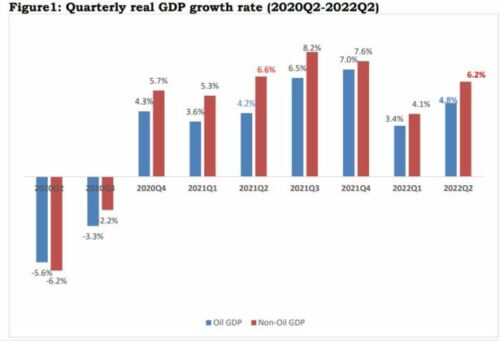According to preliminary data made public by the Ghana Statistical Service, the country’s economy expanded by 4.8% from April to June 2022 compared to the same time last year.
The real GDP of Ghana expanded by 1.1% in the second quarter of 2022 (April to June), which is 0.2 percentage points more than the growth seen in the first quarter of 2022 (January to March).
According to government statistician Samuel Kobina Annim, the manufacturing, crops, mining and quarrying, information and communication, and education subsectors were the primary forces behind GDP growth for the second quarter of 2022.
In the second quarter of 2022, the real real quarterly gross domestic product (QGDP) growth rate, which includes oil and gas, is 4.8% (year on year).
The growth at the same time in 2021 was 4.2%.
The non-oil GDP growth rate for the second quarter of 2022 is 6.2%, which is lower than the 6.6% growth rate for the same period in 2021.
The fastest-growing sector was the services sector, which saw growth of 5.2%. The agriculture and industry sectors both had growth of 4.6% and 4.4%, respectively.
In comparison to GH39,304.6 million in the second quarter of 2021, the GDP (Including Oil & Gas) projection for the second quarter of 2022 was GH41,205.5 million at constant 2013 prices.
In comparison to GH36,690.0 million in the second quarter of 2021, the non-oil GDP for the second quarter of 2022 was GH38,976.1 million at constant 2013 prices.
In purchaser’s value1, the GDP estimate for the second quarter of 2022 was estimated to be GH132,263.5 million as opposed to GH102,326.5 million in the second quarter of 2021.
In comparison to GH 97,227.9 million in the second quarter of 2021, the non-oil GDP (GDP without Oil and Gas) forecast at current prices for the second quarter of 2022 was GH 123,080.4 million.
In July, the finance ministry lowered its growth prediction for 2022 from 5.8% to 3.7%.

As the economy struggles against the backdrop of greater inflation, tighter financial conditions, and poorer growth, Ghana is in a race against time to get a bailout program.
Due to a decline in the cedi, the country’s inflation rate increased to its highest level in 21 years in August.
From 31.7% in July to 33.9% in August, consumer prices increased.
A $3 billion package from the fund is desperately needed by Ghana to support its economy.
Source:Ghanatodayonline.com
 Ghanatodayonline.com News, Politics, Health, Education & More
Ghanatodayonline.com News, Politics, Health, Education & More




